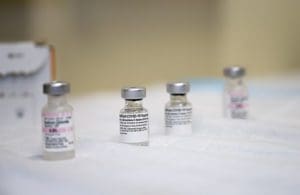
Doses of the COVID-19 vaccine at Walter Reed National Military Medical Center, Bethesda, Md. DoD photo by Lisa Ferdinando.
The Vaccines and Related Biological Products Advisory Committee (VRBPAC) unanimously supported emergency use authorization to administer the Pfizer-BioNTech Comirnaty vaccine as a booster to those 65 years of age and older, and individuals at high risk of developing severe COVID-19.
The panel, however, resoundingly rejected a plan to administer the vaccine as a booster to individuals 16 years of age and older. A total of 16 panelists voted ‘no’ while two others voted ‘yes.’
“With regard to the extrapolation of data from much older populations to 16- and 17-year-olds, we have no data on the safety in these populations at all that have been presented so far. And that concerns me significantly,” said Dr. Archana Chatterjee, VRBPAC member and dean of the Chicago Medical School. While supporting boosters in older populations, Chatterjee said she would “like to see more data before I would recommend it for a younger age group.”
The safety data for boosters are “inadequate,” agreed VRBPAC member Dr. Michael Kurilla, the director of NIH’s Division of Clinical Innovation. “The effectiveness data is pretty much limited to boosting antibody levels,” Kurilla said. Without more data on correlative protection, it is challenging to evaluate booster efficacy, he argued. “I also agree with the CDC that the incremental benefit to the younger population really has not been demonstrated at all,” Kurilla concluded.
Similarly, Eric Rubin, VRBPAC member and editor-in-chief of the New England Journal of Medicine, said “the marginal benefit of a third dose of vaccine for people who are already vaccinated is likely to be very small for reducing the overall burden.”
Complicating matters were a series of audio glitches during multiple Pfizer presentations during the VRBPAC meeting, which, at one point, prompted an unplanned break.
President Biden had vowed to make booster doses broadly available as soon as September 20, pending regulatory backing.
In August, FDA Commissioner Janet Woodcock and CDC Director Rochelle Walensky agreed to support the administration’s booster shot initiative.
The majority of experts on the panel stressed the need for more substantial safety and efficacy data before recommending authorization of the booster.
CDC’s Advisory Committee on Immunization Practices (ACIP) could potentially clarify VRBPAC’s recommendations concerning people who face a high risk of potential occupational exposure to SARS-CoV-2.
Filed Under: clinical trials, Drug Discovery, Infectious Disease





Tell Us What You Think!
You must be logged in to post a comment.